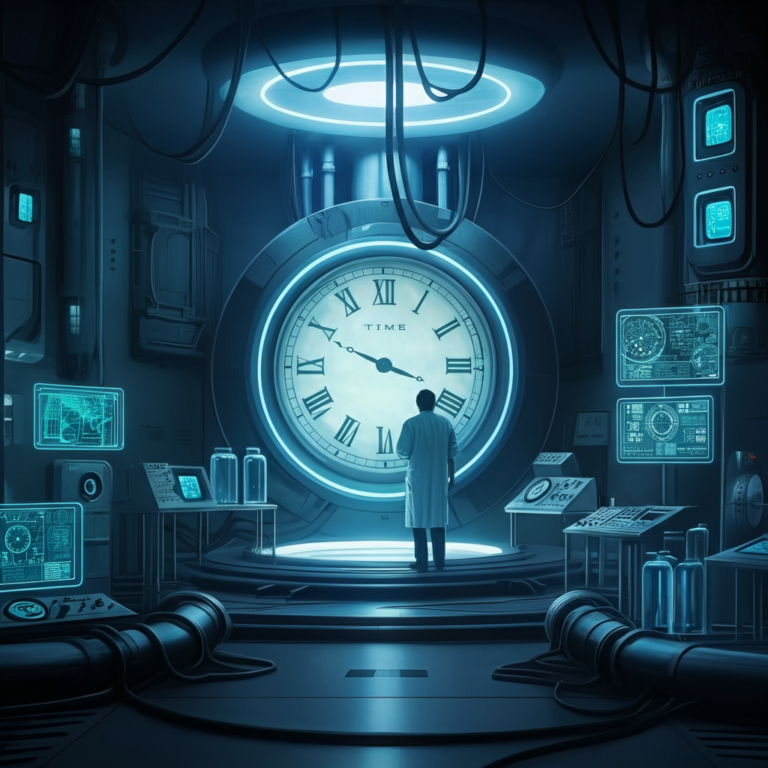Time travel has long fascinated humanity. From H.G. Wells’ The Time Machine to blockbuster films like Interstellar and Back to the Future, we’ve been captivated by the idea of bending time to revisit the past or glimpse into the future. But is time travel merely the realm of science fiction, or does it hold potential within the realms of science?
This blog dives into the fascinating, complex world of time travel, exploring what current scientific theories suggest, the challenges science faces, and whether the dream of traveling through time could one day become a reality.
Time Travel and Physics 101
To understand time travel, we need to first grasp the fundamentals of time as a concept in physics. Time isn’t just a constant flow as traditionally perceived—it’s a dimension, much like space. Together, space and time make up the spacetime continuum.
Albert Einstein’s groundbreaking Theory of Relativity paved the way for modern discussions about time travel. According to this theory, time is not universal; it can stretch, shrink, and bend depending on speed and gravity. This means the faster you travel, particularly when approaching the speed of light, the slower time passes for you relative to an observer.
The Twin Paradox Experiment
Einstein illustrated this concept through a thought experiment known as the “twin paradox.” Imagine two identical twins. One remains on Earth while the other travels through space at near-light speeds. When the space-traveling twin returns, they would be physically younger than the twin who stayed on Earth. While this demonstrates time dilation, a form of time travel into the future, it’s far from the dramatic leaps we see in science fiction.
Are Wormholes the Key?
Another popular theory involves wormholes. These are hypothetical shortcuts through spacetime, predicted by Einstein’s equations within general relativity. If a wormhole could connect two distant points in spacetime, it might allow for near-instantaneous travel between them—or even access to the past or future.
However, wormholes come with significant scientific hurdles. For one, they require the presence of exotic matter with negative energy to remain stable, something we haven’t yet observed in the natural world. Additionally, creating or maintaining a wormhole might require enormous amounts of energy, far beyond what humanity can currently achieve.
The Possibility of Traveling to the Past
While traveling into the future feels somewhat feasible due to time dilation, going back in time presents even greater scientific challenges. The grandfather paradox is one of the core conceptual dilemmas linked to backward time travel. This paradox asks, “What happens if you go back in time and prevent your own grandfather from meeting your grandmother? Would you even exist?”
This conundrum highlights the potential contradictions and vulnerabilities of altering the past. Some physicists propose solutions like the idea of consistent timelines, which theorize that any actions the time traveler takes were already a part of the historical timeline, preventing paradoxes from occurring. However, this remains speculative.
Closed Time-like Curves (CTCs)
Another interesting framework for backward time travel falls under the concept of closed time-like curves (CTCs), which refer to spaces within spacetime where you might theoretically loop back to an earlier moment. Renowned physicist Kurt Gödel developed solutions to Einstein’s equations supporting this idea, but these require specific cosmic conditions unlikely to exist in our universe.
Time Travel Technologies and Breakthroughs
Despite the many scientific hurdles involved, researchers continue to explore paths that could bring time travel closer to reality.
Ultrahigh-Speed Travel
One of the most plausible ideas involves our ability to reach ultrahigh speeds—close to the speed of light. While current technology doesn’t allow speeds anywhere near this limit, advancements in space exploration might pave the way. Projects like NASA’s work on warp drives or nuclear fusion-based propulsion methods could potentially bring the idea closer to fruition.
Quantum Mechanics and Time Travel
Quantum mechanics provides another intriguing avenue. The phenomenon of quantum entanglement—where particles can instantly affect one another, regardless of distance—raises interesting questions about non-linear time. Additionally, experiments have shown instances where particles “seem” to travel backward in time, although these findings are strictly within the quantum realm and remain far from practical application.
Artificial Manipulation of Gravity
Because gravitational fields influence time, manipulating gravity may open doors for time travel. Scientists like Kip Thorne propose creating intense gravitational manipulations using massive black holes or artificial constructs (think spinning cylinders of enormous density). The energy needs for such manipulation, however, make this technology an extremely distant possibility—if possible at all.
The Ethical and Practical Implications of Time Travel
Even if science someday overcomes current hurdles, time travel comes with a host of ethical and philosophical dilemmas.
- Altering History: Should humans have the ability to rewrite historical events, knowing the ripple effects it might create? How would we avoid unintended consequences?
- Power and Control: Time travel could become a tool for exploitation. Who should regulate access to such a powerful technology?
- Existential Confusion: Philosophers argue that time travel throws existential questions about free will and determinism into chaos.
From a practical perspective, the enormous energy demands and technological requirements make the concept far from achievable in the immediate future. Additionally, it would challenge the social, political, and economic structures under which humanity currently operates.
Could Time Travel Ever Happen?
While many scientific theories suggest that certain forms of time travel are theoretically possible, the daunting technical and practical challenges keep it firmly in the realm of speculation for now. However, the pursuit of understanding time travel continues to accelerate advancements in physics, quantum mechanics, and space exploration. These breakthroughs may someday reshape our understanding of time entirely and bring us closer to unlocking its mysteries.
What’s Next for Time Travel Research?
For now, time travel remains one of the ultimate unknowns—equal parts science, philosophy, and imagination. Yet, history proves the resilience of human curiosity. Concepts we once thought impossible—space travel, gene editing, quantum computing—have become a reality. Time travel could very well be the next frontier.
Perhaps, until science provides clear answers, our collective fascination with time is less about rewriting history or glimpsing the future and more about cherishing the present moment. After all, isn’t each passing second the truest form of time travel?





















0 Comments